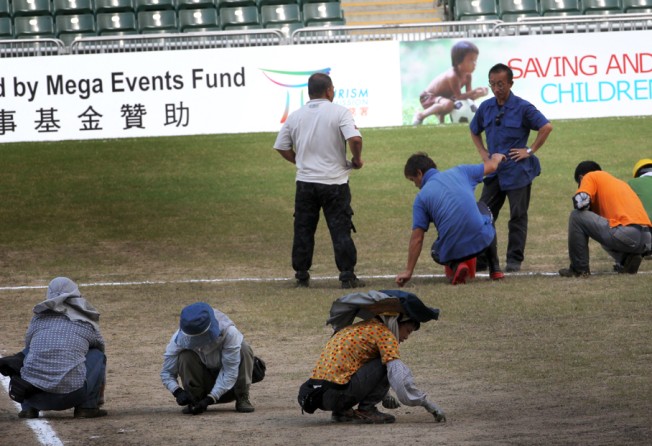
Experts question choice of turf to fix Hong Kong Stadium
Drainage problems seen as cause of bad pitch regardless of type of grass used in relaying it

The government is planning to replace the much-criticised pitch at Hong Kong Stadium with new grass that is said to be more resilient - but the choice of turf has been questioned by experts.

They said the government's trials of the new turf had been 8unscientific.
The comments come after the Leisure and Cultural Services Department told the South China Morning Post it would propose relaying the muddy pitch with a new grass named Transcontinental, after trials had shown it to be more suitable than another turf called TifGrand.
The dreadful state of the sodden pitch became a concern during a tournament prior to a match between English Premier League champions Manchester United and local club Kitchee last month, when the surface was deemed almost unplayable.
Department director Betty Fung Ching Suk-yee said amid the crisis two weeks ago that the government would consider relaying the field. The department then revealed to the Post last Friday that it had already tried out two types of grass and one would be put forward for consideration after consulting experts.
A source familiar with the department's operations said the plan is likely to go ahead. The last time new turf was laid at Hong Kong Stadium was in June 1998 at a cost of HK$1.7 million.
The two types of turf tested - known as cultivars - are Bermuda grasses, a form of warm-season grass widely used in the United States. TifGrand is sod, or pre-grown sections of grass, while Transcontinental is seed to grow grass on site. Consultants estimated relaying the pitch with TifGrand would cost about HK$5 million and sowing Transcontinental HK$1 million.
The department said Transcontinental, trials of which began in June last year, is more resilient and tolerant of shade whereas TifGrand grew slowly and experienced more wear and tear. But TifGrand was only tested for two months, starting in May.
"It's not a scientific comparison if a grass is not under trial for a full season," said Dr Eric Lee Yin-tse, a local turf specialist who questioned the findings.
"During my tenure as a turf professional, I have planted four types of seeded Bermuda grass and all the seeds failed to get established," said Lee, who has 38 years' experience. "They all germinated well but did not manage to get further and get established in the end."
Lee visited the stadium with three professors from the University of Georgia in July, a year after the new grass had been sown for the trials, and found only patches of Transcontinental growing.
The grass has become a subject of debate among turf consultants, soccer coaches and the Hong Kong Football Association since relaying the pitch was deemed an option. While some prefer natural grass, the association said it favoured a hybrid surface of grass and plastic fibres widely used overseas, including at Wembley Stadium in London.
The turf adviser for the 2010 Asian Games in Guangzhou, Professor Jimmy Zhang Jumin, echoed Lee's view. He said TifGrand grows better in venues with a large roof. He added that Zoysia, a grass from the mainland used for pitches at the Asian Games, is also a good choice for subtropical areas.
But Zhang said that no top grass would grow well if the pitch's drainage problem is not solved. "Good soil is essential to the growth of roots. Only grass with strong roots can recover quickly from damage," he said.
University of Hong Kong soil specialist Jim Chi-yung said the grasses needed scientific data to prove they are suitable for the local soil and climate, "or it will waste millions of public money".
